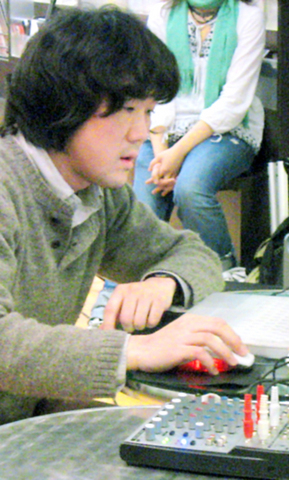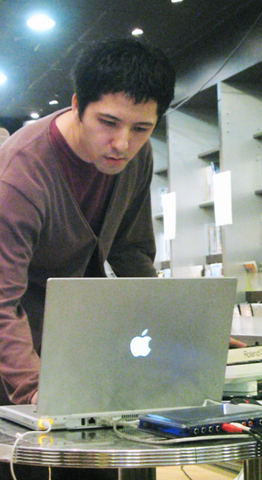What does your laptop mean to you? If you venture by NTU's Corridor Cafe tomorrow evening, you'll see four guys from Japan whose laptops serve as their artistic medium. Childish Music Concert, organized by Node Culture and Plop, is a multimedia production with a kiddish bent.
Featuring four Japan-based laptop electronica artists, the concert is aimed at kids, adults and "kidults" alike. The artists will work their aural and visual magic through a combination of acoustic instruments -- guitars, xylophones and toy instruments -- and electronic equipment -- laptops, projection screens, speakers, etc.
"Childish music," a small-but-worldwide trend in electronica, treats the ear to soft, sweet-sounding music that incorporates a variety of sound effects. The German record label Staugbold is planning to release a compilation CD later this month titled Childish Music. The CD will include tracks from two of the artists performing at NTU tomorrow night: Kazumasa Hashimoto and Lullatone.

Kazumasa Hashimoto, who encountered music at a young age and majored in composition at the Tokyo College of Music, creates pieces rich in imagery with a combination of acoustic instruments and electronic sounds. In addition to his contribution to the upcoming Childish Music he has two individual albums, Yupi and Epitaph.
Lullatone is the stage name of Shawn James Seymour. Seymour, who grew up in Kentucky but now lives in Nagoya, Japan. He likes to compose lullabies and play on toy instruments. His latest album is Little Songs About Raindrops.
The other two artists are Sora ("sky" in Japanese, the pseudonym of Kyoto's Takeshi Kurosawa) and Mondii. Another childhood musician, Sora was later influenced by the "intelligent techno" scene in the UK. His debut album, Re.sort was noted for its transformation of electronic glitches into sounds of nature, such as birds singing, insects humming and gentle waves hitting the shore.

Mondii (Nao Sugimoto) studied ethnic music in college. Once a sound designer for TV commercials, he is a "sculptor of clicks and beeps." Nao runs the Plop label and his own label Spekk.
A mini free-admission version of tomorrow's concert will be held tonight at 7:30pm at the I Prefer Concept Shop, 61, Lane 161, Dunhua S Rd, Sec 1, Taipei.

Performance notes:
What: Childish Music Concert (with artists Kazumasa Hashimoto, Lullatone, Sora and Mondii)
Where: Corridor Cafe in the NTU Sports Center (at the corner of Xinhai Rd and Xinsheng S Rd) (
When: Tomorrow at 7:30pm
Tickets: NT$600 (includes one drink) at the door

Towering high above Taiwan’s capital city at 508 meters, Taipei 101 dominates the skyline. The earthquake-proof skyscraper of steel and glass has captured the imagination of professional rock climber Alex Honnold for more than a decade. Tomorrow morning, he will climb it in his signature free solo style — without ropes or protective equipment. And Netflix will broadcast it — live. The event’s announcement has drawn both excitement and trepidation, as well as some concerns over the ethical implications of attempting such a high-risk endeavor on live broadcast. Many have questioned Honnold’s desire to continues his free-solo climbs now that he’s a

As Taiwan’s second most populous city, Taichung looms large in the electoral map. Taiwanese political commentators describe it — along with neighboring Changhua County — as Taiwan’s “swing states” (搖擺州), which is a curious direct borrowing from American election terminology. In the early post-Martial Law era, Taichung was referred to as a “desert of democracy” because while the Democratic Progressive Party (DPP) was winning elections in the north and south, Taichung remained staunchly loyal to the Chinese Nationalist Party (KMT). That changed over time, but in both Changhua and Taichung, the DPP still suffers from a “one-term curse,” with the

Jan. 26 to Feb. 1 Nearly 90 years after it was last recorded, the Basay language was taught in a classroom for the first time in September last year. Over the following three months, students learned its sounds along with the customs and folktales of the Ketagalan people, who once spoke it across northern Taiwan. Although each Ketagalan settlement had its own language, Basay functioned as a common trade language. By the late 19th century, it had largely fallen out of daily use as speakers shifted to Hoklo (commonly known as Taiwanese), surviving only in fragments remembered by the elderly. In

William Liu (劉家君) moved to Kaohsiung from Nantou to live with his boyfriend Reg Hong (洪嘉佑). “In Nantou, people do not support gay rights at all and never even talk about it. Living here made me optimistic and made me realize how much I can express myself,” Liu tells the Taipei Times. Hong and his friend Cony Hsieh (謝昀希) are both active in several LGBT groups and organizations in Kaohsiung. They were among the people behind the city’s 16th Pride event in November last year, which gathered over 35,000 people. Along with others, they clearly see Kaohsiung as the nexus of LGBT rights.